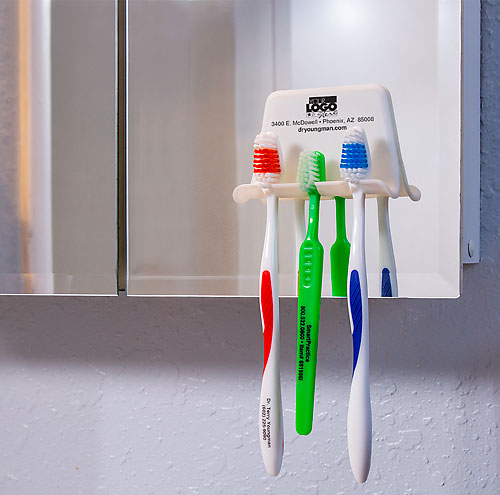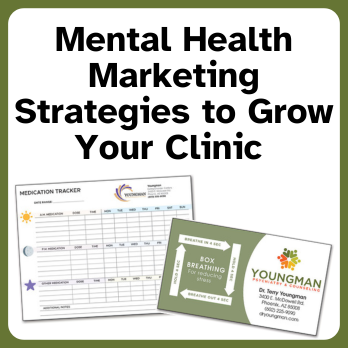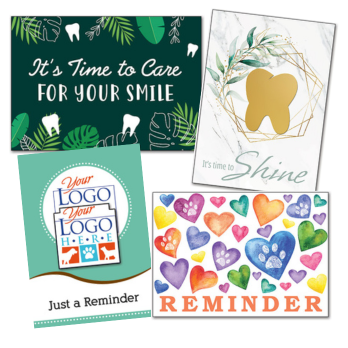We all know how important it is to brush our teeth every day, but did you know that our mouths aren’t the only place that could be harboring germs? As the American Dental Association (ADA) explains, microorganisms from our mouths and the environment grow on toothbrushes after we use them, so it is important to keep them clean, too.
Here are 5 tips that you can recommend to your patients to help them keep their toothbrushes fresh and clean!
1) Encourage patients to stop by and pick up a new toothbrush
Many dental professionals recommend changing your toothbrush about every three months, and the ADA recommends that you replace your toothbrush approximately every three to four months, or sooner if the bristles are frayed.
Invite patients that have not been to the office recently to stop by and pick up a new toothbrush and schedule an appointment while they are there. Allow patients to reserve a goodie bag ahead of time, and you can offer curbside pick up if your reception area is small.
2) Teach Patients How-to clean & disinfect their toothbrush
According to Colgate, you should clean your toothbrush after each time you use it to keep it in tip-top shape. Following the ADA’s advice, rinse the bristles thoroughly with clean water to remove any toothpaste and food debris.
You need to disinfect your toothbrush after being sick so you don’t get sick again or pass along illnesses to your family members. Colgate lists a range of options for disinfecting toothbrushes that might be contaminated with germs from an illness:
- Swirl the bristles in antibacterial mouthwash for 30 seconds
- Dissolve 2 teaspoons of baking soda in a cup of water and soak the toothbrush in the solution
- Dilute 1 teaspoon of 3 percent strength hydrogen peroxide in 1 cup of water and swish the toothbrush bristles in the solution before brushing
- Soak the bristles in vinegar overnight once per week
- Dissolve a denture cleansing tablet according to the instructions on the label and soak the toothbrush bristles in the solution
Don’t soak a toothbrush in mouthwash for longer than 15 minutes, and don’t reuse any mouthwash used for cleaning. It’s also inadvisable to put a toothbrush in a microwave or dishwasher. Heating the plastic on toothbrushes could damage the brushing edge.
Educate your patients on why this is important during appointments and encourage them to follow the tips above!
3) Share tips about commercially available mouthwashes that can inactivate SARS-CoV-2 in vitro
Considering that toothbrushes can act as reservoirs for microorganisms and favor the transmission of diseases such as COVID-19, the authors of a recent study estimate that disinfecting the brushes would be important to control the transmission of the virus in shared spaces.
The study demonstrated that commercially available mouthwashes can inactivate SARS-CoV-2 in vitro. The results showed that antiseptic solutions containing ethanol and essential oils — exemplified by the brand Listerine Cool Mint, to name one — had satisfactory effects in reducing viral load.
Remind patients not only to rinse with mouthwash after brushing, but to use mouthwash to disinfect their toothbrushes as a way to potentially protect against COVID-19. Let your patients know what mouthwashes you recommend!
4) Post reminders to store Toothbrushes out in the open
According to the ADA, toothbrushes like to be left out in the open. Store them upright and allow it to air dry. Do not routinely cover toothbrushes or store them in closed containers. A moist environment such as a closed container is more conducive to the growth of unwanted bacteria than the open air.
Encourage patients to store their toothbrushes in an open-air holder, such as our New Toothbrush Holder Shelf. This affordable product can hold up to three toothbrushes or be a shelf for one. Featuring a self-adhesive strip that will hold it firmly to most flat surfaces, the small, trim profile takes up minimum space while keeping toothbrushes clean, dry and off the counter.

5) Educate patients on social distancing their toothbrush
Not only should we social distance, but our toothbrushes should too!
Make sure toothbrushes are separated to prevent cross contamination. Let patients know to keep their brushes away from family members’ toothbrushes (especially if they’re sick). It’s also important to also keep toothbrushes far away from the toilet to prevent “toilet plume” from spreading to it. Yes, you read that right.








Just read this article to my kids ages 3-9 and they got such a kick out of the social distancing your toothbrush. Great way to have them remember that tip!
Awesome!